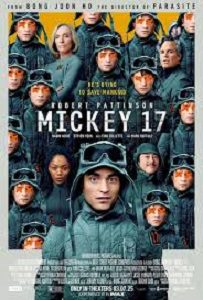Mickey 17 Movie Review: A Deep, Entertaining Look at Dehumanization.Filmygod
A Dystopian Cycle of Exploitation
Mickey 17 presents a harrowing yet thought-provoking vision of a future where technology is used not to liberate, but to entrench oppression. The story follows Mickey Barnes, a man repeatedly cloned to perform life-threatening tasks on an off-world colony. Each time he dies, a new version is created, continuing the cycle of exploitation. Mickey 17, the seventeenth iteration, has been conditioned to accept his fate. He even mutters a meek “Thank you” as his half-conscious body is shoved into molten fire to be recycled. When subjected to a cruel experiment involving poisoned food, he survives and, once again, thanks his superiors.
This dystopian narrative serves as a brutal allegory for capitalist exploitation, where human lives are treated as disposable commodities. Beyond its scathing satire of unchecked corporate greed, Mickey 17 delves into deeper themes—voluntary subservience, the psychological burden of guilt, and the ways in which love can provide fleeting solace in a dehumanized world.
Bong Joon-ho’s Vision and Direction
Director Bong Joon-ho, known for his masterful handling of social critique (Parasite, Snowpiercer), weaves a multi-layered narrative that extends beyond mere satire. While the film’s critique of capitalism is evident, Joon-ho enriches the story with a nuanced exploration of power dynamics and identity. The world he constructs is meticulously detailed, drawing clear parallels to real-world power structures.
Marshall, played by Mark Ruffalo, serves as a perfect embodiment of a modern-day oligarch—a fusion of billionaire tech moguls and political strongmen. His cult-like following, corporate branding, and authoritarian rule mirror real-world figures who blend corporate influence with ideological fanaticism. His arc represents the troubling rise of techno-capitalism, where unchecked corporate power merges with political governance, creating a new kind of monarchy.
Robert Pattinson’s Riveting Performance
Robert Pattinson once again proves his versatility, delivering a performance that brings both subtlety and emotional depth to Mickey Barnes. Through slight changes in tone and body language, Pattinson clearly differentiates Mickey 17 from Mickey 18, showcasing the gradual psychological unraveling of the character. His portrayal effectively captures Mickey’s journey—from a guilt-ridden, submissive worker to someone who questions his own humanity and fights to reclaim it.
Mickey’s guilt, stemming from a childhood accident that led to his mother’s death, makes him particularly vulnerable to manipulation. The system preys on his self-loathing, molding him into the perfect, obedient worker. This psychological aspect of oppression is one of the film’s most striking insights—how capitalism doesn’t just exploit labor but also weaponizes personal insecurities to create willing participants in their own subjugation.
The Nature of Humanity and the Soul
At its heart, Mickey 17 grapples with the fundamental question: What does it mean to be human? Throughout the film, Mickey is derided as ‘soulless’—a mere copy of an original, lacking individuality or worth. This dehumanization isn’t just enforced by those in power; even his fellow workers see him as lesser.
The film takes an intriguing turn when an alien species is introduced. Bong Joon-ho uses this extraterrestrial presence as a mirror to humanity’s own biases and fears. In one of the film’s most poignant moments, a crucial character makes a selfless sacrifice and, in doing so, is finally recognized as ‘human’ in the eyes of Marshall. At the same time, Mickey discovers that the alien species had been bluffing to protect its kind, revealing an intelligence and moral complexity that challenge human assumptions about superiority.
By the end, Mickey 17 undergoes a transformation—not through physical prowess or rebellion, but by confronting his fears. Perhaps Bong Joon-ho suggests that a soul is not a mystical essence but the capacity to acknowledge fear, to fear death, and yet still choose to protect, to love, and to respect oneself. This perspective offers a fresh take on the age-old debate of identity and consciousness.
A Worthy Successor to Bong Joon-ho’s Legacy
Mickey 17 echoes many of the themes Bong Joon-ho has explored in his past films, particularly the intersection of class struggle and systemic dehumanization. However, much like the cloned iterations of Mickey, his films never feel like soulless copies. Instead, each work builds upon his previous commentary, refining and expanding it.
In a cinematic landscape filled with uninspired franchise cash grabs, Mickey 17 stands apart. Bong Joon-ho continues to prove that even when revisiting familiar themes, his stories have soul—and are always worth experiencing.
Final Verdict: Mickey 17 is a visually stunning, intellectually rich film that transcends simple dystopian satire. With Robert Pattinson’s exceptional performance, Bong Joon-ho’s sharp direction, and a thought-provoking script, the film challenges viewers to reconsider the very definition of humanity. A must-watch for fans of cerebral sci-fi and social commentary.

Leave a Reply